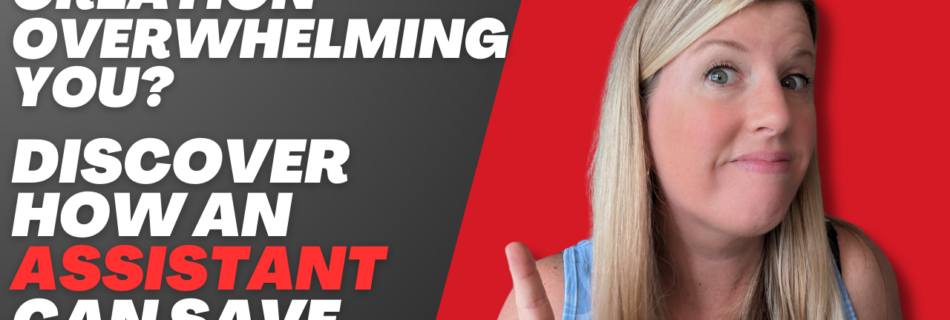The New Era of B2B Marketing: Why It’s About to Get Weird (In the Best Way Possible)
Marketing isn’t what it used to be—and that’s exactly why it’s working better for those willing to adapt. In the latest episode of the Scale Smart, Grow Fast podcast, Harley Green sat down with Brad Schlachter, Fractional CMO at The Growth Syndicate, to talk about what B2B companies must do to build predictable, scalable, and sustainable growth.
If you’re still thinking growth is all about performance ads and lead volume, you’re already behind.
Preferred listening on the go? Catch the full podcast episode on Spotify and Apple Podcasts.
🎯 Key Takeaways from Brad Schlachter:
1. Retention > Acquisition
Acquiring leads is expensive. But retaining existing customers? That’s where the real ROI lies. Brad emphasizes that reducing churn—especially for SaaS and subscription-based businesses—should be a core growth lever, not an afterthought.
2. Align Brand and Performance
Performance marketing gets clicks. But if your messaging doesn’t align with your brand’s promise, your conversions (and customer trust) will tank. One of Brad’s best examples? A Hallmark ad featuring Betty White. It wasn’t the flashiest creative—but it resonated and converted because it fit the brand perfectly.
3. Find Your “Betty White”
Every brand has that one creative, message, or moment that just clicks with their ideal customer. The key is testing, analyzing beyond vanity metrics, and staying consistent with your brand voice.
4. Do Fewer Things, Better
Too many teams are spread thin across a dozen disconnected campaigns. Brad suggests focusing on 2–3 strategic “marketing pillars” a year—aligning product launches, content drops, PR, and offers into unified, cross-functional campaigns.
5. AI Is a Co-Pilot, Not a Replacement
AI tools (like ChatGPT and marketing agents) are changing how we work—but strategy still needs a human mind. Brad recommends using AI for insights, content drafts, and automation—but keeping high-level customer and growth strategy human-led.
📈 Ready to Rethink Your Growth Strategy?
B2B marketing is evolving fast—and getting a little weird (in the best way). The brands winning today are those who lead with customer understanding, invest in retention, and align every touchpoint with a consistent brand message.
“If you’re only focused on acquisition, you’re leaving serious growth on the table.” — Brad Schlachter
🔗 Resources Mentioned:
- 📄 State of AI in B2B Marketing Report
- 🌐 The Growth Syndicate Website
- 🔗 Connect with Brad on LinkedIn
Ready to implement smarter marketing strategies without burning out your team?
Book a discovery call with Workergenix and learn how an Ultimate Executive Assistant can help you execute, optimize, and scale faster.
Like what you read? Get weekly insights on scaling, efficiency, and profitability—straight to your inbox. Click here to subscribe.Transcript:
Harley Green:
Hey everybody, welcome back to the Scale Smart Grow Fast podcast. Now growth doesn’t happen by accident. It’s engineered through strategy, execution and data. In this episode, Brad Schlachter, Fractional CMO with the Growth Syndicate and full funnel growth strategist shares how B2B and tech companies can align acquisition, analytics and retention to achieve measurable, sustainable results. With experience scaling global brands like Microsoft, Intel and Qualcomm, as well as high growth startups, Brad reveals how to build go-to-market systems that fuel predictable growth. Brad, welcome to the podcast. How are you today?
Brad Schlachter:
Good, thanks for having me.
Harley Green:
Brad, maybe you can share a little bit more about your background, what brought you to helping business leaders achieve great success with their marketing now.
Brad Schlachter:
Yeah, you know, it really starts with always being a marketer started with me being very curious about behavior. I was a psych major in college, and marketing is really about consumer behavior. And so it was always an area of interest for me. Also, at the end of the day, marketing is really about solving problems. How do you grow this brand? How do you pivot something when it clearly needs a change in direction? Solving problems and understanding human behavior has led me to have a career in marketing. As you said, I’ve worked for some bigger companies, mostly earlier in my career. More recently, I’ve worked for more small and medium-sized businesses as a fractional CMO.
Harley Green:
I love what you said about the psychology part. We recently saw this in our own business with our recruiting. We deployed a chatbot to help with the first stage of interviews and we saw the submission process and rate drop. We brought back the old form but simplified it and then just gave an automatic email saying, “Please apply here. We like your resume.” And the rates jumped up again. So I’m sure you’ve seen some similar maybe less than intuitive results with marketing that you could share with us, that give people an example of what that means about human psychology and marketing.
Brad Schlachter:
Yeah, it’s definitely very true. It’s not just what you say, but it’s how you make your customers feel. That’s the brand side of marketing. It’s not just about the rational benefits. Does the brand resonate with someone on an emotional level? That whole psychology aspect is really important and sometimes people don’t pay enough attention to that.
Harley Green:
Now, a lot of people think that marketing success is really about just generating more leads, having a bigger ad budget. How do you define sustainable growth from a marketing perspective?
Brad Schlachter:
Marketing is always different. Every company, the first thing I always try to understand when I start as a fractional CMO is getting alignment on what the business goals are. What does success equal? Because what’s success for one company may be different than for another, depending on the business model, what stage the company is in. Defining success is the first important thing. Then building a marketing plan around: this is where we are now, this is where we want to be, and this is how we’re going to get there. Ultimately, it’s also about having a sustainable model so that you know at the end of the day, you can build something replicable. If you’re going to spend $1, you’re going to get back $2 or $3 of revenue. Building that model that’s consistent.
Harley Green:
When you’re talking to these companies and helping them build out these growth strategies, what are some of the most common gaps that you tend to find, whether it’s in the strategy itself or maybe in the mindset of the leadership team?
Brad Schlachter:
One gap is performance marketing and brand. A lot of startups are very focused on leads, and rightly so. But they sometimes put too much emphasis on acquiring leads and the performance marketing aspect, and they don’t take the time and energy to make sure there’s a true product-market fit. Does the product or service resonate with the target audience or their ideal customer profile? Understanding what’s different and better or special about their product or service. These are short-term, but if you have performance marketing and brand alignment, your customer acquisition cost is going to go down, retention is going to go up, and you’re setting yourself up for long-term success.
Harley Green:
You mentioned connecting customer acquisition with analytics and increasing retention. Why is having that alignment so critical to long-term success?
Brad Schlachter:
Another common thing I see is companies are very focused on leads and performance marketing. Yes, that’s a big aspect of what marketing needs to do. But they don’t spend as much time or energy on the retention aspect. On average, it costs five or six times more to acquire a new customer than to keep an existing one. Especially for SaaS services or subscription-based services, reducing churn or increasing retention is really critical in driving long-term growth and doing it profitably. If you’re driving acquisition and getting leads, but you have a high churn rate, then you have a very leaky funnel, and it’s not sustainable. A common mistake for many companies I’ve worked with is not putting equal attention on retention versus acquisition. Retention is about understanding your customer, keeping them engaged, making sure there’s strong product-market fit, solving problems, and keeping them happy.
Harley Green:
It sounds like there’s a lot of overlap in the considerations that go into outreach from both acquisition and retention. Are there any other tips, strategies, or tools that you recommend or enjoy working with for helping on the retention side?
Brad Schlachter:
It’s really about understanding your customer and having that customer-first mentality. If you have a subscription service or really any service, you need to be doing market research. Talk to your customers. If someone cancels, have an exit survey. Understand why people are signing up and, just as importantly, why they’re leaving. There’s active churn, where people cancel and give a reason—maybe your product doesn’t meet their needs. But there’s also passive churn—people fall off because their credit card was declined or some payment issue. There are things you can do to mitigate that. Have a comprehensive plan where acquiring a customer is just the start. Then it’s about keeping them engaged. If they drop off, understand why and how to potentially get them back.
Harley Green:
Those are awesome ideas. One thing we’ve noticed from the Workergenics side—many of our clients employ executive assistants through our service to be that client care point of contact. They can lead those initiatives because often people don’t think of them as revenue-generating activities. It’s a great opportunity to bring in an affordable executive assistant to lower turnover so your marketing dollars have a higher ROI. I have another question. You’ve worked with major brands and led growth initiatives that achieved major turnarounds and exits. What’s one campaign or pivot that really changed the trajectory of a business you worked with?
Brad Schlachter:
I think it’s partly a mindset. When I was at Hallmark, we had a partnership with Roku. I helped launch Hallmark Streaming Service, now called Hallmark Plus. In the early days, we hadn’t found our best platforms. Roku turned out to be the first where we saw a lot of success. It was easier to use, the audience was older and more female, which aligned with Hallmark’s demographics. Roku’s demographics matched well. We ran an ad for a Hallmark Hall of Fame movie with Betty White. She touched all demographics—young and old loved her. She was our magic creative. Everyone needs to find their Betty White—the content and image that resonates and appeals across quadrants. It helped Roku drive early success for Hallmark Streaming. But also, it’s important for marketing teams to focus on doing two or three big things instead of 100 disconnected ones. For example, do a big push around a Betty White movie launch, a product update, a trade show, or a holiday. Pull multiple levers at once—you get more bang for your buck than doing 100 small things.
Harley Green:
What advice would you give to someone who’s doing all these marketing initiatives but everything feels scattered? How do you guide them to focus on the most impactful activities?
Brad Schlachter:
It starts with realizing that marketing can’t be done in a silo. You have to align with product, content, dev teams. I call them marketing pillars—the two or three big things you’re going to do throughout the year. Sit down cross-functionally and plan: is there a product update, a new UX, new content drop, a trade show, a seasonal event like Mother’s Day? Then, align the marketing campaign around those events. Tie it all together with PR, product updates, offers. Work cross-functionally to pull those levers together.
Harley Green:
Going back to the Betty White example, I’m sure there was a lot of studying and analysis. For business owners who won’t bring in famous actors, what are some strategies they can use to find their “Betty White” in relation to their ideal clients?
Brad Schlachter:
Betty White worked because her ads had a solid click-through rate and represented the Hallmark brand. Other ads had higher click-throughs, more provocative imagery, but lower conversions. Betty White personified the brand, which led to better conversions. When someone clicked on her ad and went to Hallmark’s service, it made sense—there was alignment. It’s not just attention, but delivering on the brand promise. It starts with understanding your customer and testing a lot. Before the Betty White ad, we had many creatives running. Some had higher click-throughs but lower conversions. Finding the right mix takes time.
Harley Green:
You bring up a good point about data. There’s so much marketing data. If someone only looks at click-through rate, they might double down on the wrong ads. How do you help people focus on the most important metrics?
Brad Schlachter:
Click-through rate matters—you can’t scale without standing out. But don’t let vanity metrics drive strategy. A high click-through with a low conversion rate is a waste. You need to look at the whole lifecycle. At Hallmark, it was a subscription service with a free trial. So we looked at click-through rate, then free trial sign-ups, and then conversion to paid customer. Follow the journey to see if the ad really worked. Optimize for metrics aligned with revenue and growth, not just top of funnel.
Harley Green:
One topic I always like to hit on is AI and automation. How do you see these tools reshaping how teams execute and measure growth?
Brad Schlachter:
It’s changing every day. Everyone’s using AI—it saves time and energy. AI is great for analyzing data, helping with content, but you still need a human to drive overall strategy and understand the customer. AI is a co-pilot. It keeps getting better, but right now it’s a tool. We’re also seeing AI agents being set up to automate tasks, especially those that are repetitive or data-heavy. Marketers have used AI for years—machine learning in paid media is AI. Now, all tools have AI assistants to help with processes.
Harley Green:
For leaders listening who want to take action this quarter to have more predictable growth, what’s one thing they can do to turn things around?
Brad Schlachter:
It’s about going back to the basics. Some marketers use the same playbook over and over without focusing on the customer. Know your customer, understand their pain points and journey. Where are people dropping off? Why? Don’t just focus on acquisition. Have a holistic view. Focus on retention. Make sure your brand aligns with your performance marketing. Pay attention to engagement. And lastly, do two or three big things instead of 100 small things. Follow that basic template and you’ll position yourself for sustainable growth.
Harley Green:
Absolutely. Understanding your customer and having real clear focus is definitely great advice for everyone listening. Brad, for those who want to learn more and connect with you, what’s the best way?
Brad Schlachter:
I’m on LinkedIn—Brad Schlachter—and I’m with The Growth Syndicate. Feel free to connect.
Harley Green:
Awesome, thank you so much, Brad. For those of you watching, if you got value today, hit the follow or subscribe button and leave a like. Every rating helps us reach more business leaders who want to grow the smart way. And maybe you know a business owner or colleague who could use this—share the episode with them. It could be exactly what they need. Thanks for tuning in. We’ll see you on the next one.
Brad Schlachter:
Thank you.






